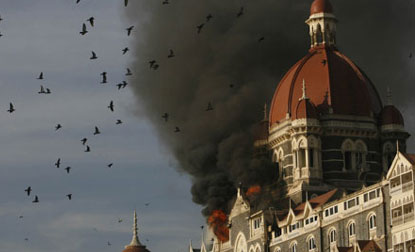 London, Nov 27: A 33-year-old British man, paralysed during the Mumbai terror attacks in November 2008, is suing the owners of the iconic Taj Mahal Palace Hotel, alleging they did little to provide security for guests despite several warnings that an assault on the hotel was imminent.
London, Nov 27: A 33-year-old British man, paralysed during the Mumbai terror attacks in November 2008, is suing the owners of the iconic Taj Mahal Palace Hotel, alleging they did little to provide security for guests despite several warnings that an assault on the hotel was imminent.
Will Pike from North London is taking legal action against the Indian Hotels Company Ltd, a part of the Tata Group.
Pike will approach the High Court in London on December 2 to argue against an attempt by the hotel owners to prevent his legal case against them being heard in a UK court, his lawyers said on the fifth anniversary of the terrorist assault on India's financial hub that left 166 people dead.
Pike was paralysed when he fell nearly 50 feet breaking his back, pelvis and leg and fracturing both his left wrist and right elbow in a bid to escape the LeT terrorists as they went through the hotel shooting residents and setting fires.
Leigh Day, his London-based lawyers are bringing a civil claim for damages against the Indian Hotels Company.
They allege the owners of the hotel did little to provide security for residents despite several warnings that an attack on the hotel was imminent.
They argue that the case should be heard in the UK, where Pike lives and where the Indian Hotels Company has a substantial business presence, based around the Crowne Plaza St James Hotel and the Taj Suites, just a stone's throw from Buckingham Palace in London.
Trying to fight the Tatas, India's largest corporate group, through the Indian courts is an exercise in futility according to Pike's lawyer, Russell Levy.
Levy said, "Mr Pike's only real hope of seeing justice is in a UK court. The court in Mumbai simply isn't geared up to deal with a claim of this kind. We estimate that it would take up to 25 years to pursue this claim through the Indian courts rather than in England, where it will take about two years.
"It is simply not right that this billion-dollar corporate giant wants to drag our wheelchair-bound client back to India and take him through a legal system where the inequality of arms would be significant," he said.
Pike and his girlfriend at that time, Kelly Doyle, who is also represented by Leigh Day, checked into the Taj Mahal Palace Hotel on November 26, 2008.
While escaping through a hotel window, the knots in the bedding cloth he used as a rope came undone and Pike fell to the ground suffering serious injuries though Doyle was saved.
Pike, who is now confined to a wheelchair, said, "My aim in taking this legal action is to pay for the life long care I now need...I do not see why the British taxpayer should have to pay for the life long care I need rather than those who I believe did not do enough to guarantee my safety and the safety of all those caught up in this atrocity."





Comments
Add new comment